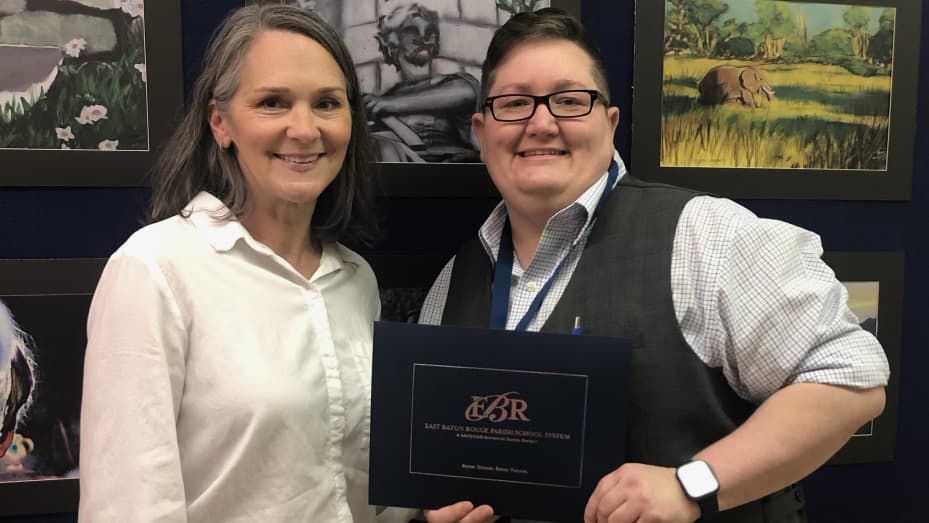Megan Hall, a biology graduate, initially ventured into the electrician field after college but found it physically demanding. Following a series of diverse jobs, including a department supervisor at Home Depot, the pandemic-induced surge in home repairs left her burnt out and considering a career change. At her partner's suggestion, she reluctantly explored teaching, despite concerns about classroom challenges and teenage attitudes.
Despite her trepidation, Hall enrolled in an online certification program and secured a high school science position in Baton Rouge. To her surprise, teaching allowed her to express her playful and open side, leading to self-discovery and a newfound passion for science. Her students' curiosity reignited her own enthusiasm, leading to her recognition as the District Teacher of the Year by the end of her first year.
Having obtained her teaching certification in 2023, Hall continues to teach with Arlington Preparatory Academy, finding unexpected fulfillment and purpose in her new career. Her journey serves as a testament to finding one's calling in unexpected places, particularly for millennials navigating a challenging job market after college.

“This is the first time that I’m really applying my degree,” she continues. “I didn’t even know I had so much passion for science. I knew I enjoyed it, but actually sharing it with people who have no idea and then watching them figure out the connections is amazing.”
Hall is among a small group of people pivoting to a teaching career. Many teachers quit due to challenging working conditions and burnout, leading to a teacher shortage that only got worse during the COVID-19 pandemic.
In the years since, shortages have shown small signs of improvement, but understaffing challenges remain, according to research from the Economic Policy Institute.
In Louisiana, where Hall works, the share of teachers who quit increased 14% during the 2021-22 school year, according to a report from the state’s Board of Elementary and Secondary Education
In response, alternative certification programs have sprung up to encourage more people to enter the field. Hall went through the program iTeach, a for-profit online teacher credentialing company that works with 11 states to help bachelor’s degree holders become certified to teach in a year to 18 months.
Critics say iTeach and similar programs are not subject to the same requirements and depth of instruction as teachers who go through a traditional four-year college curriculum.
Even so, roughly a dozen states have relaxed credentialing standards for teachers or are considering doing so, Education Week reported in 2022.
Hall says she doesn’t know many people changing careers into teaching, but understands why many educators leave the field due to stressful work conditions and lack of resources.
Then there’s the issue of teacher pay. In 2022, the average public school teacher earned a wage of $1,329 per week. Teachers earned 26.4% less than other similarly educated professionals, the lowest level since 1960, according to the EPI.
Though Hall recognizes low teacher pay is an issue for many in the profession, moving to education actually meant a pay bump in her case. She says she previously earned roughly $30,000 at Home Depot. In her first year of teaching, her starting pay was $49,000.
The financial boost provided more security for herself and Hickerson, who works as a retail fulfillment specialist, as a family. They bought their first house together in February 2023.
The best lesson her students have taught her
Hall is among many teachers who say she learns as much from her students as they learn from her.
“The best lesson that my students have taught me is just one of perseverance,” she says. She refers to two students who have traumatic brain injuries who “are capable of learning and doing, but some days are harder than others,” she says. “And I watch these kids come every day and give it what they have that day.”
“When I look at those students, and I look at them and they’re smiling through everything, and they’re being playful and having fun, you just keep going,” she adds.
She also recognizes the powerful role she can play in mentoring students as a queer nonbinary person in a Southern state.
“These kids want someone to connect with someone who sees them, someone who understands them,” she says. “My students often look around and see few places where they ‘belong,’ but I hope to show them that standing out and being different can be their special something — their superpower. In their own differences, they can find theirs.”
Hall is early in her teaching career and hopes to continue until retirement. “I love teaching,” she says. “I mean that’s the thing: I swore I wouldn’t do it, and I have never experienced anything as rewarding.”

